Last weekend I was ambitious, and I posted two posts. Some of you may not have seen my first post on dehumanization.
I’ve been thinking a lot about dehumanization - particularly in the context of the Ashley Treatment and the ensuing public discussion. Dehumanization comes in many forms, and those of us deemed the "less favored humans" face it often. So, I am reposting my dehumanization post.
 There was a time when I was a young child that I thought pronouns were bad words. When I would go to a restaurant, the waiter, with a quick, covert glance my way, would ask, "what would …. he-e-e like?” At the zoo, we would invariably encounter a grandma who would turn her eyes away from me and demand to know, "what's wrong with … hi-i-i-m?” On the first day of kindergarten, a mom walked up to my mom and asked, “what's … hi-i-i-s diagnosis?” The setting varied, but the indignity felt the same. I’d be having a good time, and then out of the blue - the dreaded pronoun, spoken with a slow, deliberate emphasis, preceded by a pause and accompanied by a lack of eye contact. These all too frequent experiences made me feel bad, but at the time I didn't understand why. I felt painfully dehumanized and blamed the pronoun.
There was a time when I was a young child that I thought pronouns were bad words. When I would go to a restaurant, the waiter, with a quick, covert glance my way, would ask, "what would …. he-e-e like?” At the zoo, we would invariably encounter a grandma who would turn her eyes away from me and demand to know, "what's wrong with … hi-i-i-m?” On the first day of kindergarten, a mom walked up to my mom and asked, “what's … hi-i-i-s diagnosis?” The setting varied, but the indignity felt the same. I’d be having a good time, and then out of the blue - the dreaded pronoun, spoken with a slow, deliberate emphasis, preceded by a pause and accompanied by a lack of eye contact. These all too frequent experiences made me feel bad, but at the time I didn't understand why. I felt painfully dehumanized and blamed the pronoun.
Dehumanization, treating people as though not human, rears its ugly head in many different ways in the lives of people with disabilities.
It can be seen…
…when we are viewed as pitiful,
…when we are called inspirational as we face the challenges that society has set up for us,
… when people treat us like cute little pets,
…when people do not speak to us but rather to our caregivers or our friends with able bodies,
…when people are overtly cruel to us because we look, talk, or think differently,
…when people assume that because we have disabilities, we don't have any gifts or talents.
In their own words, here are three individual stories of dehumanization.
Donna said,
“When I was in 7th grade, I was supposed to be wearing a brace on my right leg to support my feet as I had no ankle movement. I was picked on so badly by one girl that I refused to wear the brace. I mistakenly thought that if I didn't wear the brace, she'd stop picking on me. Was I ever wrong. I gave her much more ammunition by not wearing it. She had a few close friends whom she managed to sway into humiliating me. They did every chance they could when there wasn't an adult in earshot. I will never forget their comments - look at her skinny legs, look at how funny she walks, she can't even pick up her own feet. They'd talk about me like I wasn't even there, or like I was deaf. And if I could hear them, I'm sure they assumed I couldn't understand what they were saying. It all came to a head one day when they were passing around "slam books" where each kid had their own page. On the first page, you would sign your name on a numbered line. Then, on that same line number on each kid's page, you would write your comments about the kid. I was one of the last ones to get the book (of course, the teachers didn't know about this) and when I got to my page, out of 20 or so comments, only 1 girl said anything positive. It was one of the most humiliating moments of my life. All of the other kids were watching me read their nasty comments about me. I finally decided I was bigger than they were, so on every page, except the girl who gave me a positive comment, I wrote "no comment" on their page. I don't remember what happened after that. I just remember feeling that I never in my life wanted to feel that way again and the only way to do that was to toughen myself against other people's comments.”
“Christine” shares an example of a more subtle type of dehumanization.
“The other day, I was in the mall with my friends and this stranger comes up and gives me a hug and he was telling me, ‘everything will be all right, honey’ . Of course, he meant very well, he just didn’t understand.
David: what did you do? How did you handle it?
I just let him do it. I mean… (laugh) then he can get away from me quickly. (I) just smiled at my friends.
David: what did your friends think?
One of my friends told me that strangers talk to me like I was a baby. She said, “How can you stand it, ‘Christine’? I just told her, ‘it’s an everyday thing. It happens a lot. I just have to know how to get out.”
Darlene, a greeting card writer, says:
“I was born with mild Cerebral Palsy 55 years ago. I love life. My husband, our son and I enjoy doing almost everything … (A)fter sharing one of the poems I’d written with a lady, her reply was ‘how does a person like you write something like that’? You might ask if I was shocked by her statement; no I wasn’t, I wish I had been. What most people do not realize is appearances are misleading, so deceiving. I might look different than you, I may even stumble some when I try to continue to walk against the odds, I may even use the wrong word here and there when I start a conversation with you in the elevator. Without a second thought sir, madam, I will give you a chance to give back what so many have taken away.”
I’ve been thinking about how to help people see that we with disabilities are a part of the diversity of humanity - that we are not different inferior, different inspirational, different weird, different to be afraid of. Rather, we are different fellow humans, each of us an individual.
For the past few years, I've spent one day each March talking with classes of high school students about disabilities. I'm not sure that that's the solution, because that has me trying to undo years worth of life’s experiences in a 50 minute "lesson". The view that people with disabilities are separate from humanity is so deeply ingrained in our culture, and a lesson just addresses what’s on the surface. There’s a need to go deeper.
So, maybe, I am wondering, the thing to address is that false core belief that diversity of ability means that some are not equal members of the human race. Maybe the way to address this ignorance is through just being present more in daily life. When on my jury duty the other day, I noticed that I was the only person with cerebral palsy in the jurors’ waiting room. I wondered what the other jurors, the sheriffs, and the lawyers thought when they saw me as a potential juror. I hope that my presence impacted someone, and I wonder if this type of experience gets inside of people more than a "lesson" on disability awareness.

















